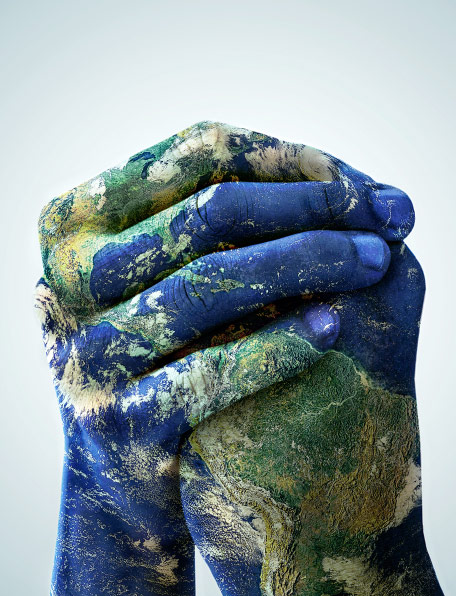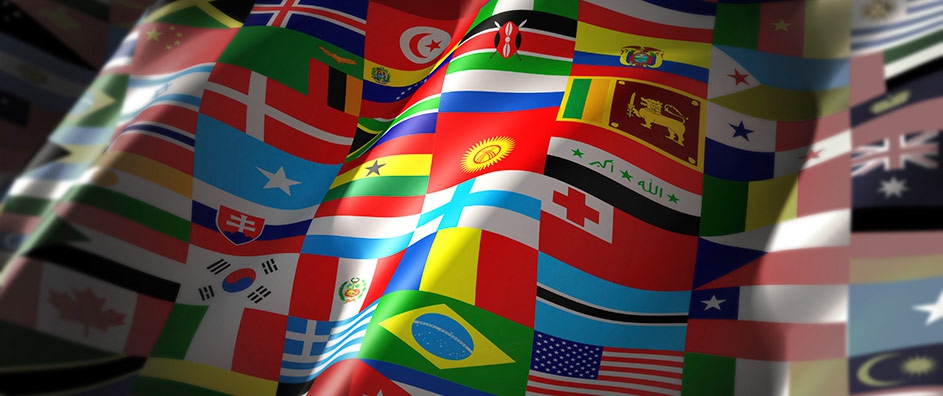The views expressed in our content reflect individual perspectives and do not represent the authoritative views of the Baha'i Faith.
We all understand the phenomenon of the bully on the playground. He engenders fear in the hearts of his potential victims, who can never know when they will be his next target. Meanwhile, the bully seems quite happy–his tyranny satisfies his emotional need for power and his other more tangible needs: he can get that fancy pen he covets or that cool sweatshirt he has been eyeing on his fellow class-mate. He seems unbeatable, until one day, his schoolmates on the playground decide they have had enough and unite to stand up to him. In the face of such decisive and overwhelming unity, the bully has no choice but to back down and retreat. The playground, once again, becomes a safe and inviting place.
This scenario plays out time and again in the global arena, except that we rarely, if ever, experience the final stage in which all nations unite to face and stop an aggressor.
Our world has several powerful nation states that play the role of the bully in the international arena. They build nuclear arms that threaten peace in flagrant contravention of agreed-upon international laws. They commit human rights atrocities on an unimaginable scale, deliberately decimating segments of their population in wanton acts of genocide and in violation of international norms. They colonize and assert territorial control over lands that do not belong to them, because they contain natural resources that these nations covet, or because they want to broaden their sphere of influence. But for some reason, the community of nations suffers from repeated paralysis in the face of such destructive behavior.
The Baha’i teachings offer a remedy for this paralysis. They propose that in addition to creating a World Parliament and a World Court, the international community also create a World Executive that represents all nations and acts in their collective interests to preserve world peace. To properly discharge its duties, that Executive would have the authority to implement the international legislation passed by the World Parliament in those areas that affect the collective interests of all nations (see Part II of this series):
A world executive, backed by an international Force, will carry out the decisions arrived at, and apply the laws enacted by, this world legislature, and will safeguard the organic unity of the whole commonwealth. – Shoghi Effendi, The World Order of Baha’u’llah, p. 203.
The Baha’i writings also describe the World Executive as having the power to enforce the decisions of the World Court (discussed more fully in Part III of this series), thereby ensuring that the world has a way to peacefully resolve disputes between nations:
When the Supreme Tribunal gives a ruling on any international question, either unanimously or by majority rule, there will no longer be any pretext for the plaintiff or ground of objection for the defendant. In case any of the governments or nations, in the execution of the irrefutable decision of the Supreme Tribunal, be negligent or dilatory, the rest of the nations will rise up against it, because all the governments and nations of the world are the supporters of this Supreme Tribunal. – Abdu’l-Baha, Foundations of World Unity, p. 33.
The wisdom underlying these words is evident: There is no point in passing international laws for the benefit of all peoples if we have no means of enforcing them. Similarly, regardless of how wise and well-considered the judgments of a World Court are, they are useless, if we lack the means to put them into action.
 To assist the World Executive in enforcing these international laws and judicial decisions, the Baha’i Teachings envision that the international community will create an international standing army, composed of armed forces representing all the nations of the world. This international military force will act at the behest of the World Executive and in accordance with laws and criteria that all nations agree upon in advance.
To assist the World Executive in enforcing these international laws and judicial decisions, the Baha’i Teachings envision that the international community will create an international standing army, composed of armed forces representing all the nations of the world. This international military force will act at the behest of the World Executive and in accordance with laws and criteria that all nations agree upon in advance.
We can easily imagine the benefits of such a system. Experts have concluded that it is cheaper to create and maintain an international standing army than for individual nations and the United Nations to fund military interventions as they seek to maintain peace around the world. Such a system would spread the costs, whether financial or in human resources, among all nations without imposing a disproportionate burden on any single nation.
The deterrent value of such a system is also very high. A bullying, aggressor nation would be far less likely to engage in behavior destructive to the peace of the world if it knows that the community of nations has both the will and the means to stand up to it. Moreover, in the face of such collective will and enforcement mechanisms a bully nation can no longer succeed in pitting other nations against each other, rendering them impotent in the face of its destructive behavior, by accusing them of nefarious motives like religious prejudice or a bid to control energy resources.
Finally, a standing army can act quickly and effectively, at the first sign of trouble, to maintain the peace without allowing the problem to fester and grow unwieldy.
Imagine how much more peaceful and secure our world could be, if we built the kind of global decision-making and enforcing institutions proposed in the teachings of Baha’u’llah.
You May Also Like
Comments

















We see that a standing army is not necessary from the example of Costa Rica which has only a police force.
The causes of war are not military but that upon which militaries depend namely economic interests and the profits from war and war preparation.